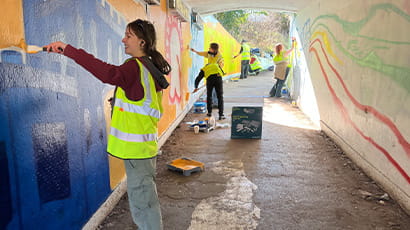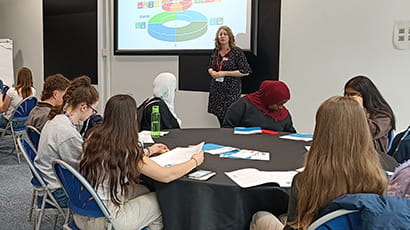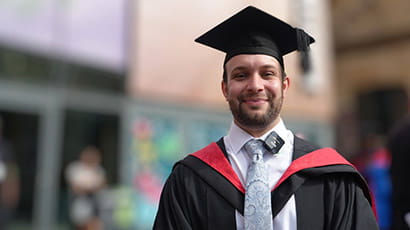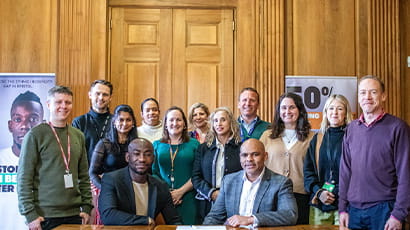UWE Bristol in top rankings for widening access

UWE Bristol has ranked highly for its intake of students from under-represented groups according to new data released by the Higher Education Statistics Agency (HESA).
The university ranked 9th in the UK and 1st in the South West for the number of students enrolled from under-represented groups.
Results showed that in 2019–20, UWE Bristol enrolled more than 4,400 young, full-time undergraduate students from state schools and colleges and 745 from low participation neighbourhoods; areas where young people are least likely to pursue higher education. In total, 94.4% of UWE Bristol’s young, UK full-time undergraduate entrants in 2019–20 were from state schools compared to a UK average of 90.1%.
The data also revealed that 9.2% of full-time undergraduate students at UWE Bristol in 2019–20 were in receipt of Disabled Students' Allowance (DSA), compared to the UK average for universities of 7.0%.
Vice-Chancellor of UWE Bristol, Professor Steve West, said: ‘‘We are proud to be a diverse and inclusive university which celebrates differences and provides opportunities for people from all backgrounds. UWE Bristol is committed to working with local communities to remove barriers and increase access to higher education, enabling young people to realise their aspirations and fulfil their potential. Through education, we believe we can create a fairer and more equal society where everyone has the chance to thrive.’’
Over the years UWE Bristol has introduced a range of widening participation initiatives designed to improve access to higher education for people from under-represented groups, including the highly successful Future Quest outreach programme. Led by UWE Bristol and funded by the Office for Students, the programme is a Bristol-area partnership of higher education providers, schools, colleges, employers and local authorities, all working collaboratively to encourage young people to progress into university.
The scheme targets areas of the city where students are less likely to progress to university and equips young people with knowledge of and pathways to higher education alongside key skills that can help them in the future.
Some of the Future Quest outreach activities include: a mentoring scheme for post-16 students from Black, Asian and Minority Ethnic (BAME) backgrounds; a programme to support 350 disadvantaged young people to progress into the fields of medicine, pharmacy and allied health professions; and the #IAmFirstGen campaign which connects young people who are first in their families to go to university with relatable role models, networks and practical support.
Since its foundation in January 2017, Future Quest has engaged with over 11,000 students from more than 40 schools across Bristol.
Related news

25 November 2025
New community initiative launches to support parents in their child’s education pathway
A new community initiative supporting parents and carers to become champions for their children’s futures launched this month in Bristol.

19 March 2025
Professor plays key role in formation of Europe’s first conference for minoritised life scientists
A professor from UWE Bristol has played a leading part in organising Europe’s first conference supporting scientists from marginalised and underrepresented backgrounds.

07 March 2025
UWE Bristol and Ashton Park School transform urban landscape near university campus
Students bring creativity and a splash of colour to a well-used city underpass by painting a new mural celebrating diversity and inclusivity.

03 February 2025
Exhibition celebrates inaugural year of students’ creative agency
Students from UWE Bristol’s New Wave Creative Agency will showcase their work at an exhibition at Arnolfini from 8 February.

12 November 2024
UWE Bristol to help inspire next generation of young people into green careers
UWE Bristol will play a key role in a new programme to educate more than 10,000 young people in the West of England about green skills and help them explore eco-friendly careers.

17 September 2024
Repair Café returns to UWE Bristol’s School of Engineering
UWE Bristol’s Repair Café returns this autumn with a special ‘repairs skills day’ on 25 September, ahead of the café reopening monthly from 9 October.

29 July 2024
Student who dedicated his time at university to helping disabled people graduates
A student who has dedicated his time at UWE Bristol to helping people with disabilities has graduated.

16 July 2024
UWE Bristol launches major new suite of online degrees and expands partnership with Skilled Education
UWE Bristol is launching a major new suite of online degrees. In partnership with global experts in online higher education, Skilled Education, students can study Master’s degrees in Data Science, Education Leadership and Human Resource Management entirely online.

05 April 2024
University joins new partnership to combat inequality
UWE Bristol has signed up to a ground-breaking agreement to address inequality and deprivation for Bristol’s low-income communities.

18 January 2024
Funding awarded to UWE Bristol to boost female participation in engineering and construction industries
UWE Bristol will increase numbers of women on engineering and construction degree apprenticeship courses to address industry underrepresentation, supported by funding from the Office for Students (OfS).

17 October 2023
UWE Bristol supports Wildlife Photographer of the Year exhibition as it returns to Bristol
The world-renowned exhibition, on loan from the Natural History Museum in London, opens at Bristol Museum and Art Gallery on Saturday 21 October.

15 August 2023
Former inmates to benefit from enterprise education course shown to reduce reoffending and boost employment
UWE Bristol has successfully secured funding from the City & Guilds Foundation to deliver enterprise education to previously incarcerated people.






